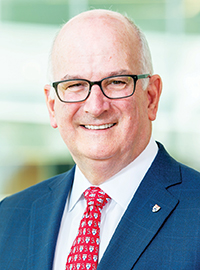
- From CEO Kevin B. Mahoney
2020 was a year that transformed our lives, our work, and our relationships with our friends and loved ones. A turning point — a pivotal sign of hope on the horizon — came in December, the day the Food and Drug Administration authorized the first COVID-19 vaccines for emergency use.
Just weeks later, we have already provided over 43,000 doses of the vaccine to our workforce. It will still take time to produce and distribute vaccines across the communities we serve, and during these months, we'll need to continue our vigilance with masks and social distancing to keep each other safe. At the same time, we must hold up those among us who are grieving the losses of friends and family taken by the virus, and support our communities to heal and rebuild from economic damages of the pandemic. But our horizon is now one of hope.
To transform this hope into a reality — in order for the powerful science behind the vaccines to have maximum impact and put an end to the pandemic — our communities must feel comfortable receiving the vaccine. And while we are moving quickly to vaccinate those in our workforce, our allied health partners and the surrounding communities, and laying plans to give shots to our patients, we must also face the challenge of addressing vaccine hesitancy.
Vaccine hesitancy is a complex issue that impacts many groups in our workforce and the communities we care for and live in. In part, vaccine hesitancy is linked to a long history of racial injustices in medicine which have, understandably, left Black and brown communities worried about the safety of the new COVID-19 vaccine. But we know there are questions from many other groups — pregnant women or patients with cancer and those who've had transplants, for instance, may wonder about whether the vaccine is right for them.
We are working to provide answers and guidance to everyone, and to encourage honest conversations no matter your perspective or your personal choices. We welcome you to ask questions and seek out guidance from Penn Medicine experts. You'll see people across our health system wearing buttons prompting conversations: "Ask me about the COVID-19 Vaccine." We want you to share your stories, your worries, your questions — and to get the facts. It's your right to make informed decisions about your health and we are here to help.
To me, believing in the COVID-19 vaccine is to believe in the power, rigor, and process of science. The foundation for that science was developed right here at Penn Medicine nearly 20 years ago through key discoveries at the Perelman School of Medicine that made a whole new type of vaccines and treatments for numerous diseases a possibility — including the new COVID-19 vaccines from Pfizer-BioNTech and Moderna. After testing in clinical trials across the world, we know these vaccines are safe, and that the benefits of receiving it greatly outweigh the risks — especially the risks of contracting COVID-19.
But there's many more people in our workforce who are here to be a resource if you want to know more. Our colleague, Florencia Greer Polite, MD, chief of the Division of General Obstetrics and Gynecology, is just one among many impassioned ambassadors who are at the ready to talk with those looking for accurate information and to share her story of why she trusts the vaccine — and why it will be crucial to leveling the disproportionate toll of COVID-19 on her own Black community.
"Like many Black physicians," Polite wrote in a powerful column in The Grio, "I have been vocal about the need to address our community directly: to own the past mistakes of the medical profession, to acknowledge the current disparities that exist in health care and to share with our community why we think this vaccine is not only important, but vital in the efforts to decrease the destruction of the coronavirus.
"I trust the science behind the vaccine and I hope that when the time comes for the vaccine to become available to the public, that my community will be ready to trust the medical profession again. I can only imagine the devastation if we opt out of this scientific revelation."
Beyond the vaccine development, the pandemic has accelerated innovation in countless ways. It has also underscored the timelessness of our work. Everyone who has fought against COVID-19, whether in the lab or at the bedside in our hospitals or in countless roles across our health system that support our mission to care for patients, has drawn on the decades of work that came before to make us ready for this fight. The hope ahead of us now did not arise from magic or luck, but from hard work and devotion to our core missions in academic medicine.
This commitment has led us to our current moment — one fueled by the power of science, and of true hope for the end of this pandemic.
For COVID-19 vaccine information, please consult the COVID-19 website. You can also visit our mRNA vaccines page for the latest on mRNA vaccine technology.